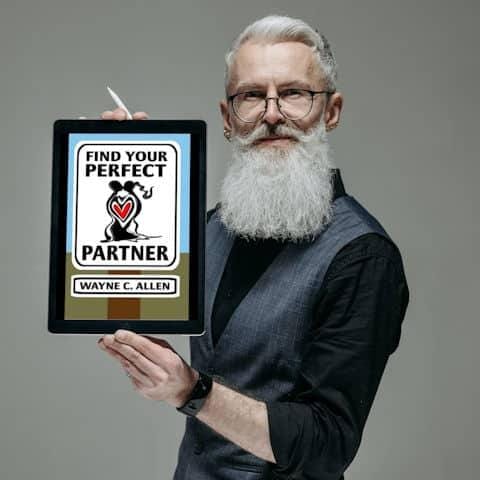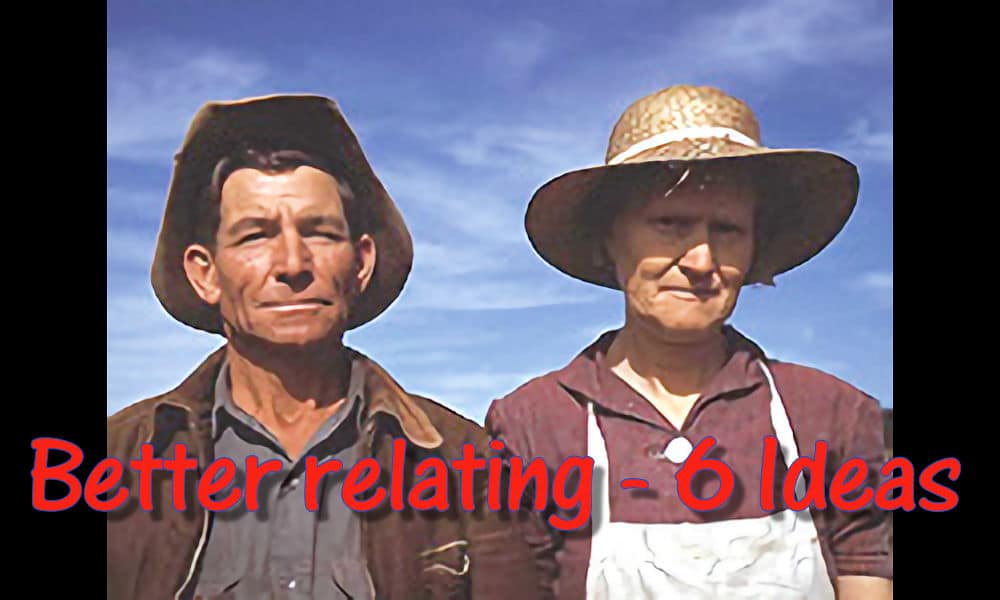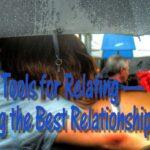- Ideas for Zen Living: 12 Presence Presents
- 5 Communication Tips
- 10 Quick Examples of Zen Living
- Better relating — 6 Ideas
- Fearless Living — 7 Tips
- 5 ways to pay attention
- 10 Zen Principles to Help You Live Life Better
- 7 Ways to Live in This Endless Moment
- 5 Key Concepts for Zen Living
- 9 Tools for Relating
- 3 Riffs on Relating
- Vulnerability — 5 things
- 5 Life Lessons You Need to Get
- 9 Ways to Screw up a Relationship
- 10 Things Your Mommy Forgot to Tell You
Better relating — Of all the ways to Deepen Relationships, here are 6 of my favourites

If your present relationship needs work, well…
check out
The. Best. Relationship. Ever.
It’s my relationships book… you’ll find all the help you need!
Purchase all formats at Amazon
Purchase digital versions (Apple, Nook, Kobo, etc.) from this page

Hey! Stop playing with that stick and listen to me!
I suspect that most folk do not examine their relationship—except when things are off the rails.
There’s a tendency to think
- that relationships are supposed to “just work,” and
- that the purpose of finding a partner is to have someone there to magically meet your needs.
Nothing could be further from the truth.
To quote David Schnarch, in “Passionate Marriage,
“a primary relationship is a crucible. In other words, the heat of the relationship is the “thing” that makes the crucible’s contents pure. Thus, in the heat of dialog and passion, the couple enters into a proving and refining ground that makes each person more “him or herself.”

This is decidedly different from the norm.
The norm is all about a battle for superiority and “rightness.”
People in stuck relationships tend to believe that there is only one way to see things, only one view of the world, one view of how to relate, etc.
And coincidentally, that correct view is held by the person espousing it!
Almost no one in a dysfunctional relationship is saying, “Your way is the right way.” No, emphatically they are saying, “My way is the right way.”
I do not believe in “right” ways. I believe in personal growth, and this is best fostered in the crucible, the heated container, of intimate relationship.
The thing I love best about my relationship is that Darbella sees right through me and my games, and chooses to hang around with me anyway. And vice versa.
I can’t remember the last time something I said or did surprised her, and vice versa. She knows me. And she calls me on my stuff. And vice versa. This is the basis of our relationship.
1. In good relationships, there is redirection to what’s really going on—we describe this as “calling each other out.”

Calling out is not criticizing or “making wrong.”
“Calling each other on our stuff” is helping each other to snap out of dreamland, so that each of us pays attention to the story we are spinning.
Example: Someone says, “My spouse really makes me angry.” I would ask, “Why do you choose to anger yourself over your spouse?”
This shifts everything. It helps the hearer shift into a place of becoming responsible for his / her feelings.
The initial statement, on the other hand, can only open a discussion about the supposed flaws of the spouse, as perceived by the speaker.
This can have only a couple of purposes:
- 1) to get agreement that the spouse is a jerk, or
- 2) to get sympathy.
Neither is particularly helpful.
Deciding that another person is “making you angry” is silly, and changes nothing either about the other person or the situation.
Most stuff we anger ourselves over is the same stuff we always anger ourselves over. Someone does “x” and I decide that this behaviour disagrees with my fantasy about what the person ought to be doing.
So, I blame the other person for not cooperating with my fantasy, then I make myself angry.
Calling someone out when they use non-responsible language, (for example) involves not biting on provocative statements, not joining in on blaming, but simply inviting one’s partner to correct their language.
Once I remember I am angering myself over something that is out of my control (the behaviour of another,) I might be moved to let it go, or to select a behaviour that I can take, as opposed to simply blaming.

Find Your Perfect Partner
If you are not in a relationship, and want to do a much better job finding a partner that suits you, have a look at my book, Find Your Perfect Partner.
You’ll find the tools you need to engage your brain!
Direct link to Amazon for all formats
Purchase digital versions (Apple, Nook, Kobo, etc.) from this page
2. In good relationships, there are no secrets.

Who I am, how I am, and what I am feeling and thinking must be made available to my partner. And I mean the direct experience.
A client once described getting angry with her husband. “So I spent the next several hours telling him how angry I was.” I asked her if she actually got angry, as in yelling, stomping about.
She crossed her arms over her chest, and crossed her legs tightly, and said, “I’m not interested in going there.”
Expressing anger directly follows the pattern of # 1, above.
Say, “I am angering myself,” not “you make me angry.”
Then go ahead and pound a pillow or stomp about.
The anger is enacted as a clear statement of,
“This is what I saw (heard) from you, and I am angering myself, and I want to yell a bit before I process it.”
We express our emotions appropriately, directly, and safely. We are then able to move on. Repressed emotions always come back to haunt you.
After all, talking about anger without learning to safely express anger (or any other emotion, of course) is like the difference between describing an orgasm and having one.
In good relationships, the filters and the evasions are set to “off.”
At the same time, and this is essential, I am completely self-responsible. I admit to creating my experience, my interpretations and my feelings, and I don’t attempt to hide any of it.
A primary relationship is the place to be fully alive, and part of being alive is enacting all of our feelings—not just the “fun” ones—safely and directly .
3. In good relationships, both people are respectful of the personhood, beliefs, and essence of their partner.
The key here is respect, (high regard, admiration.) That this is not the norm in most relationships is obvious.
No matter how it is described, most relationships are about control.
By control, I mean that one or both of the partners attempts to force or manipulate their partner into doing life their way.
- Force is, “Unless you… I’ll punish you by…”
- Manipulation is, “If you do this… THEN I’ll do that…”
Respect is, “Hmm. You see it this way and I see it that way. Interesting.”
The piece I’ve never understood is the arrogance of thinking that, just because I’m married to, or in relationship with someone, that somehow this gives me the right to change that person.
And at the same time, I think that the other person has absolutely no right to expect me to change. Because I, of course, am right, and (s)he is wrong.
Respect for personhood — this is my way of saying that my partner is whole and complete as she is, and also remains whole and complete as she changes with time. In other words, she is as she is, and how she is is something I choose to find delightful.
Respect for beliefs — I still laugh at “discussions” Dar and I have had over buzzy topics like family members, education, therapy, etc. There are wide differences in our perspectives, and neither of us will budge. I know that I want her to think like me, because I argue so hard. However, at the end of the day, what Dar believes is what she believes, and it’s the same for me.
Respectful of essence — each of is here, I believe, to fulfill a personal destiny or purpose. Our skill set, our way of being, is intrinsic, and lies just under the surface, gently tugging us to get on with it. This essence is the truth of us, and again, I’m amazed at how many people think it is their right to demand that their partner change their essence.
Respect is only possible if I am willing to accept my partner as (s)he is. To do this, I have to drop my desire to teach, lecture or control.
4. In good relationships, there is no right and wrong. There is acceptance and curiosity.

Well, it certainly seems like there is right and wrong.
You may bump your nose against an, “I don’t enjoy doing that” scenario, and that’s OK.
There’s nothing wrong about the thing you do not enjoy, and it is your right to not do it. Getting into the judgment game proves nothing, as your belief about right and wrong is only and always about you.
Acceptance and curiosity, on the other hand, open doors. You get the opportunity to explore and attempt, and even if you decide to only do something once, you’ve grown with the experience.
Most people I know actually aren’t very adventuresome, and really don’t push their boundaries and limits very much at all, and it seems odd to me that, given how little experimentation they do, they have so many opinions about stuff they’ve never tried.
I say,
“If you are afraid of something, do that next.”
Being open to new possibilities, while dropping the judgement is the best way to deepen a relationship.
5. Good relationships are engaged, passionate relationships.
Passionate engagement is the willingness to stick your neck out so that your partner sees the real you.
Mostly, people hide.
They seem to think that their partner, the person they are supposed to be the most intimate with, should never see the “truth” of them. They stuff their anger, hide their passions, and walk around carefully, lest they ruffle any feathers.
We propose active engagement.
By this I mean letting Dar know exactly and completely where I stand, what’s up for me, and what I am feeling. All the time.
We do this by practicing total honesty.
Sure, sometimes I make myself uncomfortable telling her what’s up for me, but I know the danger of keeping that stuff to myself.
Now remember, this revelation is being done in the context of the above points.
- I am not being passionately honest in order to change Dar, or manipulate her into doing something.
- I am being revealing to let her know more about me, and in this way, to deepen our intimacy.

If your present relationship needs work, well…
check out
The. Best. Relationship. Ever.
It’s my relationships book… you’ll find all the help you need!
Purchase all formats at Amazon
Purchase digital versions (Apple, Nook, Kobo, etc.) from this page
6. In good relationships, there is no compromise.
Compromise never works.
If I compromise, afterwards I will only think about what I gave up. So, when Darbella and I disagree, we sit down, and we talk, and we stay with it until both of us can agree with our decision, 100%.
We are not 3‑year-olds; we do not stomp our feet and demand that we get our way. We are adults, and we come to consensus.
Not always easy, but I only remember 2 times in 38 years that it’s taken us longer than an hour.
Because we are not playing games.
Period.





